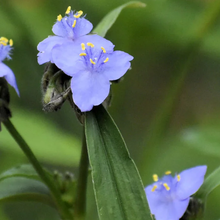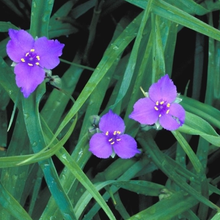Tradescantia virginiana is a clump forming perennial with arching grasslike foliage and striking three petaled flowers that open in the morning and close by afternoon. Blooming in shades of blue, purple, and occasionally white, it offers a long flowering window and a bold splash of color in shady or mixed light conditions. Its early growth emerges reliably in spring and can be cut back after flowering to encourage fresh foliage.
Height & Spread: 12 - 24 in x 12 - 18 in
Bloom Time: Late spring to midsummer
Light Requirements: Full sun to part shade
Soil Preference: Moist, fertile to average soils
Watering Needs: Moderate; tolerates short dry periods once established
Deer Resistance: Moderately resistant
Native Status
This species is native to the eastern and central United States and commonly found in open woods, thickets, and along streambanks.
WILDLIFE & INSECTS
Butterflies
- Visited by butterflies such as Silvery Checkerspot and Spring Azure for nectar and shelter.
Bees
- Highly attractive to bumblebees, leafcutter bees, and other native solitary bees especially early in the day when flowers are open.
Moths
- Foliage serves as a larval host plant for moth species such as Common Looper and Tradescantia Leaf Miner.
Birds
- Seed capsules may be eaten by small songbirds and the dense foliage provides low cover for ground foraging birds.
Spacing & Landscape Use
Spacing Recommendations
- Space 12 - 18 in apart to form neat clumps and allow airflow between plants.
Landscape Placement
- Well suited for mixed borders, shade gardens, cottage gardens, and naturalized woodland edges. Cut back midsummer for a neater habit and fresh foliage.
Companion Plants
- Iris cristata (Dwarf Crested Iris) - Early blooming and low growing, it pairs well under Tradescantia’s taller arching foliage.
- Heuchera americana (Coral Bells) - Adds colorful foliage contrast and thrives in similar filtered light conditions.
- Carex pensylvanica (Oak Sedge) - Provides a fine textured ground layer and helps knit together part shade plantings.
- Geranium maculatum (Wild Geranium) - Complements Tradescantia with its mound form and soft pink blooms.
- Phlox divaricata (Woodland Phlox) - Offers spring blue blooms in a similar color palette, creating a harmonious early season display.



